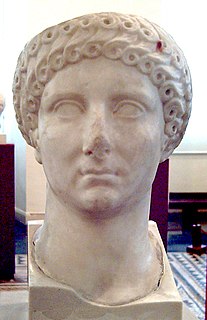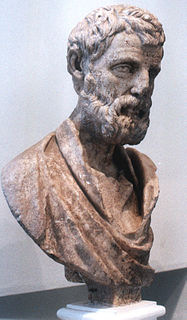
Vipsania Agrippina, commonly referred to as Agrippina the Elder, was a prominent member of the Julio-Claudian dynasty. She was born in c. 14 BC the daughter of Marcus Vipsanius Agrippa, a close supporter of Rome's first emperor Augustus, and Augustus' daughter Julia the Elder. At the time of her birth, her brothers Lucius and Gaius were the adoptive sons of Augustus and were his heirs until their deaths in AD 2 and 4, respectively. Following their deaths, her cousin Germanicus was made the adoptive son of Tiberius as part of Augustus' succession scheme in the adoptions of AD 4 in which Tiberius was adopted by Augustus. As a corollary to the adoption, Agrippina was wed to Germanicus in order to bring him closer to the Julian family.

Julia Agrippina, also referred to as Agrippina the Younger, was a powerful Roman empress and one of the most prominent and effective women in the Julio-Claudian dynasty. Her father was Germanicus, a popular general and one-time heir apparent to the Roman Empire under Tiberius; and her mother was Agrippina the Elder, a granddaughter of the first Roman emperor Augustus. She was the younger sister of emperor Caligula, the niece and fourth wife of emperor Claudius who succeeded Caligula, and the mother of emperor Nero, who succeeded Claudius.

Claudius was Roman emperor from AD 41 to 54. Born to Nero Claudius Drusus and Antonia Minor at Lugdunum in Roman Gaul, where his father was stationed as a military legate, he was the first Roman emperor to be born outside Italy. Nonetheless, Claudius was an Italic of Sabine origins and a member of the Julio-Claudian dynasty. Because he was afflicted with a limp and slight deafness due to sickness at a young age, his family ostracized him and excluded him from public office until his consulship, shared with his nephew Caligula in 37.

The Julio-Claudian dynasty was the first Roman imperial dynasty, consisting of the first five emperors—Augustus, Tiberius, Caligula, Claudius, and Nero—or the family to which they belonged. They ruled the Roman Empire from its formation under Augustus in 27 BC until AD 68, when the last of the line, Nero, committed suicide. The name "Julio-Claudian dynasty" is a historiographical term derived from the two main branches of the imperial family: the Julii Caesares and Claudii Nerones.

Marcus (Vipsanius) Agrippa was a Roman general, statesman and architect. He was a close friend, son-in-law, and lieutenant to Augustus and was responsible for the construction of some of the most notable buildings in the history of Rome and for important military victories, most notably at the Battle of Actium in 31 BC against the forces of Mark Antony and Cleopatra. As a result of these victories, Octavian became the first Roman Emperor, adopting the name of Augustus Caesar. Agrippa assisted Augustus in making Rome "a city of marble" and renovating aqueducts to give all Romans, from every social class, access to the highest quality public services. He was responsible for the creation of many baths, porticoes and gardens, as well as the original Pantheon. Agrippa was also husband to Julia the Elder, maternal grandfather to Caligula, and maternal great-grandfather to the Emperor Nero.

Nero was the fifth Roman emperor, ruling from 54 to 68. His infamous reign is usually associated with tyranny, extravagance and debauchery. Nero, originally named Lucius Domitius Ahenobarbus, belonged to the Julio-Claudian dynasty, and was adopted as heir by the emperor Claudius, his great-uncle and stepfather. Nero succeeded Claudius while not yet aged 17, and his mother, Agrippina, tried to dominate his early life and decisions, but Nero cast her off and had her killed five years into his reign.

Tiberius Claudius Caesar Britannicus, usually called Britannicus, was the son of Roman emperor Claudius and his third wife Valeria Messalina. For a time he was considered his father's heir, but that changed after his mother's downfall in 48, when it was revealed she had engaged in a bigamous marriage without Claudius' knowledge. The next year, his father married Agrippina the Younger, Claudius' fourth and final marriage. Their marriage was followed by the adoption of Agrippina's son, Lucius Domitius, whose name became Nero as a result. His step-brother would later be married to his sister Octavia, and soon eclipsed him as Claudius' heir. Following his father's death in October 54, Nero became emperor. The sudden death of Britannicus shortly before his fourteenth birthday is reported by all extant sources as being the result of poisoning on Nero's orders—as Claudius' natural son, he represented a threat to Nero's claim to the throne.

Aelia Paetina or Paetina was the second wife of the Roman Emperor Claudius. Her biological father was a consul of 4 AD, Sextus Aelius Catus, while her mother is unknown.
Claudia Acte was a freedwoman of ancient Rome who became a mistress of the emperor Nero. She came from Asia Minor and might have become a slave of the Emperor Claudius, following his expansion of the Roman Empire into Lycia and Pamphylia; or she might have been purchased later, by Octavia, Claudius' daughter.

Drusus (Julius) Caesar was the adopted grandson and heir of the Roman emperor Tiberius, alongside his brother Nero. Born into the prominent Julio-Claudian dynasty, Drusus was the son of Tiberius' general and heir, Germanicus. After the deaths of his father and of Tiberius' son, Drusus the Younger, Drusus and his brother Nero Caesar were adopted together by Tiberius in September AD 23. As a result of being heirs of the emperor, he and his brother enjoyed accelerated political careers.

Herodes Atticus, or Atticus Herodes, son of Tiberius Claudius Atticus Herodes, was a Greco-Roman politician and sophist who served as a Roman senator. Appointed consul at Rome in 143, he was the first Greek to hold the rank of consul ordinarius, as opposed to consul suffectus. In Latin, his full name was given as Lucius Vibullius Hipparchus Tiberius Claudius Atticus Herodes. According to Philostratus, Herodes Atticus was a notable proponent of the Second Sophistic. M.I. Finley described Herodes Atticus as "patron of the arts and letters, public benefactor on an imperial scale, not only in Athens but elsewhere in Greece and Asia Minor, holder of many important posts, friend and kinsman of emperors."

Nero Julius Caesar was the adopted grandson and heir of the Roman Emperor Tiberius, alongside his brother Drusus. Born into the prominent Julio-Claudian dynasty, Nero was the son of Tiberius' general and heir, Germanicus. After the deaths of his father and of Tiberius' son, Drusus the Younger, Nero and his brother Drusus were adopted together by Tiberius in September AD 23. As a result of being heirs of the emperor, he and his brother enjoyed accelerated political careers.

Julia Livilla was the youngest child of Germanicus and Agrippina the Elder and the youngest sister of the Emperor Caligula.

Lollia Paulina, also known as Lollia Paullina (15-49) was a Roman Empress for six months in 38 as the third wife and consort of the Roman emperor Caligula. Outside of her term as a Roman Empress, she was a noble Roman woman who lived in the Roman Empire of the 1st century.
Aconia Fabia Paulina was an aristocratic woman and one of the last pagan Romans who tried to save the Roman religion from decline.

The Pons Neronianus or Bridge of Nero was an ancient bridge in Rome built during the reign of the emperors Caligula or Nero to connect the western part of the Campus Martius with the Campus Vaticanus, where the Imperial Family owned land along the Via Cornelia.

Agrippina condotta a morire or Dunque sarà pur vero, HWV110, is a dramatic secular cantata for soprano, two violins and continuo, composed by Georg Frideric Handel while he was in Italy, at some time between 1707 - 08. The anonymous text depicts Roman empress Agrippina the Younger on the way to her execution, which was ordered by her son, the emperor Nero, whom she had schemed to put on the throne. The title of the cantata, which is approximately fifteen minutes in length, may be translated as "Agrippina condemned to die".
Claudia Pulchra (14 BC – AD 26) (PIR2 C 1116) was a Patrician woman of Ancient Rome who lived during the reigns of the Roman emperors Augustus and Tiberius.

The Temple of Claudius, also variously known as the Temple of the Divus Claudius, the Temple of the Divine Claudius, the Temple of the Deified Claudius, or in an abbreviated form as the Claudium, was an ancient structure that covered a large area of the Caelian Hill in Rome, Italy. It housed the Imperial cult of the Emperor Claudius, who was deified after his death in 54 AD.